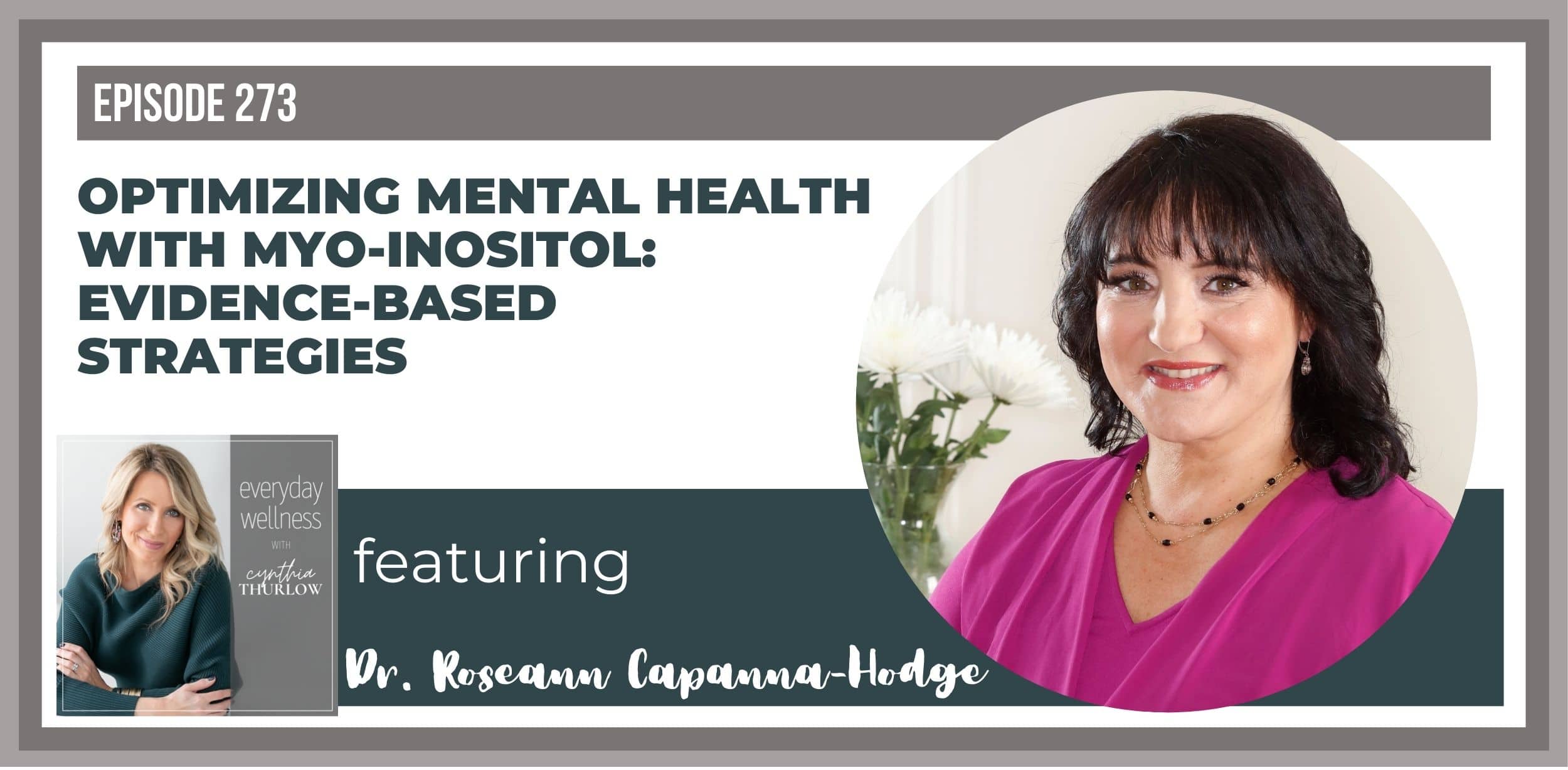Summary of Ep. 273 Optimizing Mental Health with Myo-Inositol: Evidence-Based Strategies:
Dr. Roseann Capanna-Hodge, a pediatric mental health expert, discusses the role of Myo-inositol in mental health on the Everyday Wellness Podcast. Inositol is a constituent of the phospholipid layer of the cell membrane, abundant in the brain and nerve tissue, and tied to neurotransmitters such as dopamine and serotonin. Low magnesium can exacerbate the need for Myo-inositol, and individuals with anxiety, depression, OCD, bipolar disorder, panic attacks, agoraphobia, and eating disorders tend to have low Inositol levels. In addition, hyper-processed, hyper-palatable nutrition, low salt intake, insulin resistance, aging, and antibiotics can deplete Inositol stores in the body. Supplementing with Myo-inositol and magnesium can improve symptoms of mood disorders.
*****
The Role of Myo-inositol in Mood and Mental Health: A Conversation with Dr. Roseann Capanna-Hodge
Mental health struggles are a common problem, but the treatment options available are often limited. That’s why it’s important to consider alternative modalities for dealing with these issues.
In this episode of the Everyday Wellness Podcast, Dr. Roseann Capanna-Hodge, a renowned pediatric mental health expert, joins host Cynthia Thurlow to discuss the potential benefits of myo-inositol for mood and mental health.
Understanding Myo-inositol
Myo-inositol is a constituent of the phospholipid layer of the cell membrane, which helps mediate communication between cells in response to hormones and cell growth. It’s abundant in the brain and nerve tissue and is tied to key neurotransmitters like dopamine and serotonin. In addition, it helps regulate specific hormones, including thyroid secreting hormone, insulin, and glucose.
The problem is that our modern-day lifestyles can deplete our levels of myo-inositol. Low magnesium, hyper-processed and hyper-palatable nutrition, low salt intake, insulin resistance, aging, and antibiotics all contribute to this depletion.
Connecting the Gut and the Vagus Nerve
Most people don’t realize the strong connection between the gut and the vagus nerve, which regulates the autonomic nervous system. The gut is actually the body’s second brain and is responsible for producing over 90% of the body’s serotonin. When the gut is unhealthy, it can negatively impact mental health.
One of the key components to addressing mental health struggles is myo-inositol supplementation, which has been shown to improve symptoms associated with anxiety, depression, OCD, bipolar disorder, panic attacks, agoraphobia, and eating disorders.
Additional Ways to Calm the Autonomic Nervous System
In addition to myo-inositol, there are other ways to calm the autonomic nervous system and reduce inflammation in the brain. These include:
– Reducing exposure to toxins
– Eating healthy fats, including omega-3s and 6s
– Managing stress through practices like mindfulness, meditation, or yoga
– Treating any underlying health conditions that may be contributing to inflammation
The Importance of Addressing Trauma
Trauma is a key factor in mental health struggles and should not be overlooked. It’s important to address any past trauma and work through it in order to move forward and heal.
Reframing Negative Thoughts
Reframing negative thoughts and focusing on positive experiences can also be a powerful tool for improving mental health. It takes practice, but the more you do it, the easier it becomes.
Final Thoughts
It’s important to understand the link between lifestyle factors, gut health, and mental health. By prioritizing healthy habits like myo-inositol supplementation, reducing toxin exposure, and managing stress, you can make a positive impact on your mental health and overall well-being.

